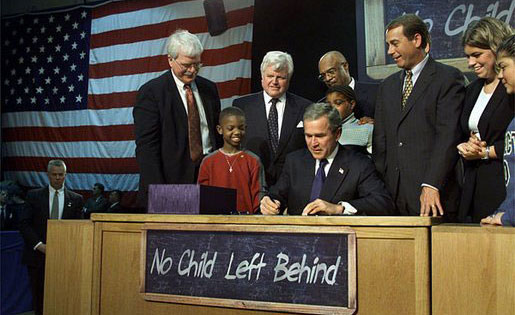Debate promises: education (2000)

For the next two weeks, the First Year Project takes a look at some promises made in past debates. Today, we explore George W. Bush’s efforts to reform education.
On October 3, 2000, Governor George W. Bush debated Vice President Al Gore in Boston. Bush said:
You must have mandatory testing. You must say that if you receive money you must show us whether or not children are learning to read and write and add and subtract. . . . Testing is the cornerstone of reform. You know how I know? Because it's the cornerstone of reform in the State of Texas. Republicans and Democrats came together and said what can we do to make our public education the best in the country? We've gone a long way working together to do so. The cornerstone is to have strong accountability in return for money and in return for flexibility.
Even before the inauguration, President-elect Bush acted quickly to begin what would become the No Child Left Behind Act (NCLB). On January 23rd, three days after his inauguration, Bush unveiled his education plan, meeting met with Senator Ted Kennedy (D-MA) on the same day. Kennedy supported Bush’s ideas, but not a school voucher plan. In March, the NCLB Act was introduced, and by September 11th, in an effort to get Congress to fund public schools, the president visited an elementary school in Florida. First Lady Laura Bush was in Kennedy’s office waiting to testify before the Senate Education Subcommittee. Then the planes hit.
However, even 9/11 did not stop the negotiations. Bush gave in on his proposed school voucher program and signed the final bill on January 8, 2002, just before completing his first year in office.
President Bush’s education advisor, Sandy Kress, reflects in his Edward M. Kennedy Oral History interview about the power of working across the aisle—and how those efforts broke down after law was passed:
Now part of the problem was [Senator Jim] Jeffords. He was very slow to move. We weren’t sure he’d move a bill, and if Kennedy wasn’t interested in moving a bill, we were worried, very worried, about making progress in the Senate, in those first few months of 2001. So I think at the end of the day, history will have to say it really was Kennedy’s decision. I think Kennedy decided that the time was right to move on this…
This was maybe a month after the President was in, after those nice encounters, and we were getting a little nervous. Maybe he saw that we were getting a little nervous, because Jeffords wasn’t in any particular hurry. His staff was saying, “This could take a year, a year and a half.” The President wanted it done in six months. We were meeting away and crafting up with the Republicans. Kennedy knew all that and he just said, “Let’s get started…”
It stunned him [Bush] that we didn’t know, that the Department of Education couldn’t tell him, we couldn’t tell him, from the Department of Education data, which schools were making progress and which ones weren’t. He thought that was incredible, that the records weren’t there, that there was no data. So if we didn’t even know which ones they were, he thought that this lack of data, transparency, and real accountability was a serious problem…
I wish he [Bush] had given more creative thought and energy to this [about schools under-performing]. And I wish that Kennedy had continued to, more than he did. I wish they had found a way to keep this going, because I think that was the next question. How do we make this happen? We passed this law, how do we implement it? What are our next steps? Kennedy clearly felt that more money was important. I suspect Bush would have been concerned about resistance to the reforms which did, after all, come with a lot of additional money…I think if they had continued to talk, and they had sat down the way we did in these negotiations, and said “OK, I need more money.” “OK. What are the problems?” That was the way we used to talk. “What problems do we want to solve? How do we best solve them? What’s the best program to do it?” Those conversations really didn’t continue, in my judgment, and they should have, and as a result, Kennedy began to feel distant, and then they were having arguments on other issues…
I think Bush knew we weren’t going to get it—vouchers. We couldn’t win a vote in the House Committee. Forget the Senate. We had only so many votes on the floor of either side, even in the modest one we had, and to Bush’s credit—and he got a lot of criticism from the right on this—he said, as Kennedy did, “We’re going to get the best deal we can get, and it probably won’t have that idea in there.”
In this case of a debate promise, bipartisanship, a trait Bush claimed on the campaign trial, paid off in his first year in office.